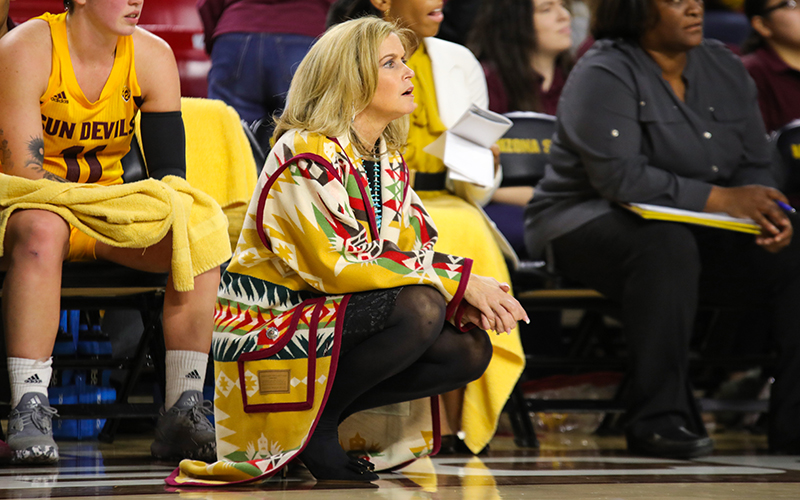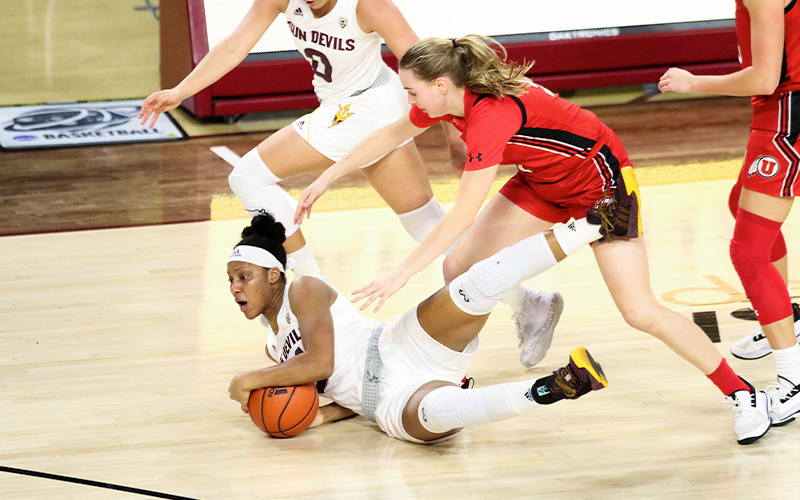
Arizona State women’s basketball coach Charli Turner Thorne is pleased with the postseason experience her young team gained. (File photo by Brady Klain/Cronkite News)
TEMPE – Under coach Charli Turner Thorne, Arizona State women’s basketball has been synonymous with playing well into the month of March. This season was no different, as the Sun Devils made an appearance in the 2021 WNIT in Fort Worth, Texas.
It was ASU’s sixth appearance in the WNIT and 20th trip to the postseason out of the last 21 years a postseason tournament was held.
Even though it wasn’t an NCAA Tournament bid, Turner Thorne and her team welcomed the opportunity to play in a postseason tournament.
“These are all young kids who haven’t been there and done it,” Turner Thorne said before the tournament. “(The WNIT is) the same timeline as the NCAA Tournament and we play through March. That’s our program and that’s what we do. In a crazy year to have that opportunity for this team would be invaluable.”
In postseason play, the Sun Devils were 1-3, including a loss to the USC Trojans in the first round of the Pac-12 Tournament. Throughout the postseason, the Sun Devils’ greatest weaknesses were exposed, providing a blueprint of what needs to improve for the 2021-2022 season.
Slow starts nagged the Sun Devils all season, yet they consistently battled back and found themselves with a chance to win late in games. The postseason was no different.
Against the Trojans, the Devils fell in a quick 9-0 hole and the deficit reached 21 points in the second quarter. In the second half, the Sun Devils fought back but were unable to cap off a comeback, falling short 71-65.
Freshman Maggie Besselink scored 13 points and collected 10 rebounds in the loss, recording her first career double-double.
In the final game of the season against the Houston Cougars, the Sun Devils found themselves looking at the scoreboard over six minutes into the game and only seeing three points next to their name.
ASU trailed by as many as 12 against the Cougars, but once again found themselves with a chance to win the game in the fourth quarter before falling 50-48.
Heading into next season, an emphasis will be placed on being ready to play right out of the gate and not forcing themselves to chase the game.
“We need to come into the game ready,” freshman Katelyn Levings said, “We have to be able to start strong and play off one another.”
Entering postseason play, the Sun Devils had consistently been able to close out games, winning five of seven games during the regular season decided by two possessions or less. However, two out of ASU’s three postseason losses were decided by two possessions or less.
In all three games at the WNIT, ASU found itself with a lead in the fourth quarter. In its losses to Rice, who won the tournament, and Houston, the Sun Devils were unable to capitalize on late chances to take over and win the game, getting outscored 29-11 in the final frame of those two games.
“You (must) have a sense of urgency, every possession matters,” Turner Thorne said after her team’s season ending loss to Houston. “I’m hopeful that they got a sense of how important toughness is. … (Houston) was tougher down the stretch and they took the game.”
Shooting the basketball was ASU’s biggest weakness all season long. On the WNIT stage, it was only magnified.
In their three WNIT games, the Sun Devils scored a measly 44.7 points per game and shot less than 32% as a team.
In stark contrast, ASU’s defense, the strength of the team, was lights out in Fort Worth.
Facing Rice in the first round of the WNIT, the Sun Devil defense held an offense that averaged 70 points per game and a 48% shooting percentage to only 15 points in the first half and 48 for the game, shooting 44%. ASU lost by 12.
In a consolation matchup against Missouri, who averaged over 73 points per game and shot at a 48% clip, the Devils allowed the Tigers to score just over half of their season average in a 50-39 victory. The Tigers were held below 39% shooting.
Houston averaged nearly 67 points per game and just under 39% shooting. Against the Sun Devils, the Cougars could only manage to score 50 points and a shooting percentage under 36% but still pulled off a comeback victory.
In total, the Sun Devil defense allowed a minute 45.7 points per game and a 39% shooting percentage, which should have been more than enough to win all three of those games.
Increasing how often the ball goes in the basket will be priority number one this offseason for the Sun Devils, who knew they had to bring it on defense to counteract their shortcomings on the other end of the floor.
“A big thing this year was to focus on our defense because our offense was not going as we wanted it to,” Levings said. “We weren’t always as disciplined as we should have been. So we need to be more disciplined next year, buy into the team culture and play together.”
It’s no secret this edition of the Sun Devils was young and inexperienced. ASU had no returning starters from last season and only one senior on the roster.
The leaders of the Sun Devils youth movement are freshmen Jaddan Simmons, who averaged 10.8 points per game to become the first ASU freshman to average double figures since Jill Noe in 2002-2003, Katelyn Levings and Maggie Besselink. All three appeared in over 75% of ASU’s 24 games this season, most of those appearances being starts.
This group will only get better with experience, which is why it was such a necessity for ASU to participate in any postseason competition.
“All three had great freshman campaigns and have learned a lot and gotten better,” Turner Thorne said. “The biggest challenge is that those three didn’t have the benefit of a lot of experienced players showing them the way. They were baptized by fire. … That makes what they did this year so much more impressive.”
With a team so young, Turner Thorne acknowledged that there would likely be some bumps in the road, but she’s glad to see her team come out the other side.
“I’m really proud of our team,” Turner Thorne said. “We’ve been up and down but that’s what young teams are. Given all the limitations and circumstances of this year … we were probably going to be fairly inconsistent. For them to regroup and keep things in perspective and stay positive was tremendous. They showed great grit.”

